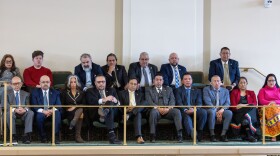Tulsa officials announced Thursday the city will form a commission to explore how to give reparations to victims of the 1921 Tulsa Race Massacre.
Tulsa’s Beyond Apology commission stems from a report of the same name that surveyed Tulsans' attitudes around reparations for massacre survivors and their descendants. A white mob in 1921 razed Tulsa's prosperous Black Wall Street and killed as many as 300 people, according to estimates from historians.
Mayor G.T. Bynum noted the Beyond Apology report's only recommendation was to form a commission to explore possibilities for reparations. The report also showed Tulsans recommended educational and economic opportunities, financial compensation and housing for massacre descendants and north Tulsans.
"Any time in the past when you would bring up reparations, people would immediately jump to one form of reparations and debate that all day instead of taking the time to work through our areas of agreement," said Bynum.
The announcement comes about a month and a half after the Oklahoma Supreme Court dismissed two living massacre survivors' reparations lawsuit against the city. The state's high court rejected the lawsuit on grounds that Oklahoma law doesn't currently have a way to give reparations. The attorneys' lawyer has publicly said the survivors need reparations in cash payments.
At a news conference Thursday, Bynum called the lawsuit "punitive" to Tulsans who live in the city today.
Bynum is creating the commission with City Councilor Vanessa Hall-Harper, whose district encompasses former Black Wall Street. Bynum noted Hall-Harper "strongly disagrees" with him on the lawsuit.
"The easiest thing in the world would be for her to write me off and ignore me because of that disagreement, but she hasn’t. She has instead chosen to work with me with what is an important step in the right direction," he said.
Hall-Harper said the survivors will participate in the commission as they're able.
“I know what they want — we all do, and they’ve been very clear about that. They want justice, and this is just one way. Not the only way, but this is one way that we can get closer," she said.
Once formed, the commission will set annual priorities and goals from the Beyond Apology report, the city's equality indicators report and the state's 2001 report on the race massacre.
One of the commission's first tasks is to create a plan for a housing equity program "to advance the goal of creating intergenerational wealth" among survivors, descendants and north Tulsans.
Bynum said the city could use more than $70 million allocated in the latest round of Improve Our Tulsa sales tax money for the housing piece. Hall-Harper said the commission could look to other cities that have created housing initiatives in their reparations programs.
"We want to learn from them and engage, learn as much as we can so that we can get things done a lot faster, and without all the bumps and bruises. I don’t feel that we have to reinvent the wheel," Hall-Harper said.
The commission will also assess and recommend a purpose for the Evans-Fintube site in north Tulsa, which has sat unused for decades.
Bynum said he wants "immediate action" from the commission — as in, steps he can take before he steps down as mayor in December.
“It is so important for Tulsans to think about what you would expect if the race massacre happened today. You would expect the perpetrators to be held to account. You would expect the victims to be found. You would expect the insurance companies to fund the reconstruction of the property that was destroyed," Bynum said. "None of that was done in 1921."
This report was produced by the Oklahoma Public Media Exchange, a collaboration of public media organizations. Help support collaborative journalism by donating at the link at the top of this webpage.









